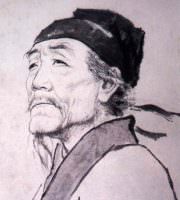About Tu Fu
Tu Fu (also known as Du Fu) was a distinguished Chinese poet of the Tang dynasty. Along with Li Bai (Li Po), he is frequently referred to as the best of the Chinese poets. His biggest aspiration was to serve his nation as a successful citizen, however he proved struggling to develop the mandatory accommodations. His existence, like the entire nation, was in the mercy of a great internal An Lushan civil war in 755, and his remaining 15 years had been an occasion full of almost continuous disturbances. Even if he was in the beginning recognized by his pairs and other poets, his writings got to be massively prominent both in chinese and japanese literary traditional oral literature. From his poetic texts, almost fifteen hundred rhymes happened to be preserved over time until our days. He mastered all the forms of Chinese poetry: Chou says that in every form he either made outstanding advances or contributed outstanding examples. Furthermore, his poems use a wide range of registers, from the direct and colloquial to the allusive and self-consciously literary. This variety is manifested even within individual works: Owen identifies the, rapid stylistic and thematic shifts in poems which enable the poet to represent different facets of a situation, while Chou uses the term juxtaposition as the major analytical tool in her work. Du Fu is noted for having written more on poetics and painting than any other writer of his time. He wrote eighteen poems on painting alone, more than any other Tang poet. Du Fu's seemingly negative commentary on the prized horse paintings of Han Gan ignited a controversy that has persisted to the present day.Browse all poems and texts published on Tu Fu
He has been known as the "Poet-Historian" as well as the "Poet-Sage" by Chinese critics, while a number of his last writings means him to get unveiled in western literary circles as "the chinese language Virgil, Horace, Ovid, Shakespeare, Milton, Burns, Wordsworth, Branger, Hugo or Baudelaire".









